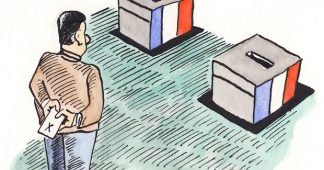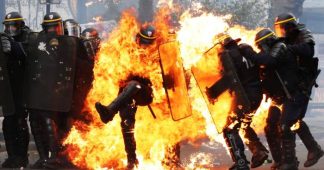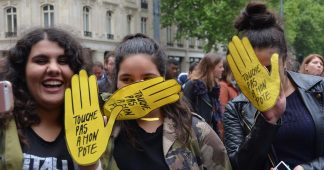Paris, from Dimitris Konstantakopoulos
Many believe that the left-right divide is obsolete, but the class struggle seems as present as never before. As the philosopher Régis Debray remarks there was an intense class coloration of the vote that during the first round of the presidential election, which exposed a France divided in four. The “new strata”, the happy winners from globalization (Macron), the losers and the lost, les paumés primary small deindustrialized cities and the countryside (Lepen), the traditional property-owning bourgeoisie (Fillon) and the “dissatisfied for good reason” (Mélenchon).
“Monsieur, there is great misère”, the woman says to me in Monoprix, glaring at me and abandoning the usual reserve of employees in such shops at the idea of opening a political discussion with customers. “How can anyone live on 1,000 euros?” (SMIC, salaire minimum de croissance, legally the lowest salary) she asks. It is obvious that she supports neither Macron nor Le Pen.
On the contrary, I have no doubt that the well-dressed gentleman at the entrance to my hotel is going to vote Macron. “If Lepen wins I will leave France,” he says, but is very puzzled when I observe that Le Pen is helping Macron and Macron Le Pen. Since the days of Marie-Antoinette the French “on top” have lived in a very different country to those underneath.
The “on top” and the “underneath”
The taxi driver outside the airport looks me up and down before saying “You smoke. So do I. Let’s go, and have a smoke together.” He wastes no time haggling over the price, throwing my luggage on board and ignoring the protests of his colleagues sitting in the rank.
“Macron is likely to win”, says Memé, for that is his name, weighing his words. He is acutely aware of the political situation in France and the world and has a very clear view of his own (class) interest. It is hardly necessary to say anything for one to comprehend that he belongs to a people’s France, by definition deeply opposed to the camp personified by Emmanuel Macron and the Rothschilds.
“How do you feel,” I ask him, “French or Algerian?” “What can I say?” he replies. “I was born in the 20th (arrondissement of Paris). In Algeria they call me French, in France Algerian. I have both citizenships.” And he asks me if he can take Greek citizenship too. “What do you want it for?” I ask him. “I like Greece and I love Greeks.”
He eyes me, rather taken aback, when I ask him his opinion of Le Pen, but the answer is self-evident, “ a Fascist”. While we are sitting in the traffic jam a woman in the car alongside opens her window and asks him the way to her destination. He tells her and then, to oblige me I suppose, asks her what she is going to vote.
“I’m not going to vote. Enough is enough”, she says. And after a couple of seconds she continues, “What’s the choice? Between plague and cholera?” She is one of those not inconsiderable number of French people who are simply at a loss when confronted with the choice they face tomorrow.
In an instant, complicity is established between them and the woman conveys to him, with some anxiety, an internet address. “Go there and take a look at what the doctors are doing, the malpractices in medicine!” she says, before we are caught up in the metallic flood of vehicles on the Périphérique.
“And Mélenchon?” I ask Memé. “Ah, he is good, very good,” he answers and suddenly his face takes on an expression that is almost one of love for the candidate of “La France Insoumise” who is in any case the only one, along with the two Trotskyists of the first round, who always behaves like a normal person, takes the metro to work, etc.
In a vote they asked the activists of “La France Insoumise” the question of whether they would be voting for Macron or would be abstaining or casting a blank ballot. Two thirds said they would be voting for Macron and one third abstaining or casting a blanc vote. But the opinion of the activists does not necessarily reflect the opinion of Mélenchon voters as a whole. And in any case 11% of them in one poll said that they would be voting for Le Pen.
A country split four ways
Whoever becomes President, France is now a deeply and multiply divided country. Macron may be talking a great deal about reconciliation but reconciliation is the only thing that is certain not to emerge from these elections, or from their sequel.
The elections, it is worth noting, are not ending tomorrow with the election of the President. They will continue into a “third round”, with the parliamentary elections next month and, the activists of Jean-Luc Mélenchon’s “La France Insoumise” predict, into a fourth round also, the “hot autumn” that “Macron-Micron”, as they dub him ironically, is expected to trigger. If he persists with his plan to pass new labour “reforms” by presidential decree.
Marine Le Pen, for her part, is endeavouring to present herself as the only representative of “the People” against the System, but the shock emergence of Mélenchon, which has revitalized a Left everyone regarded as dead and now appears more or less worthy of its name, has deprived her of the monopoly of “anti-systemicity”, whether genuine or bogus.
Most of the voters of Fillon and Mélenchon will no doubt vote for Macron, however heavy-heartedly, to keep Le Pen out. Much more so after the failure of her performance as presidential in the debate with Macron, when she offered little more than a tirade against her rival. She tried to some extent to make amends the next day (again without avoiding the extreme aggressiveness that is spoiling the show for her, such as when she spoke out against the “deadbeats”, les “racailles” of the far Left), but she seems on balance to have been wrongfooted.
No observer in France regards it as probable tomorrow that Le Pen will win, though no surprises can be excluded in today’s conditions in Europe. But if, as appears most likely, the majority will yield to its own “republican”, “antifascist” reflexes, it seems to be the last time that it is likely to be doing this.
Translated from Greek by Wayne Hall











